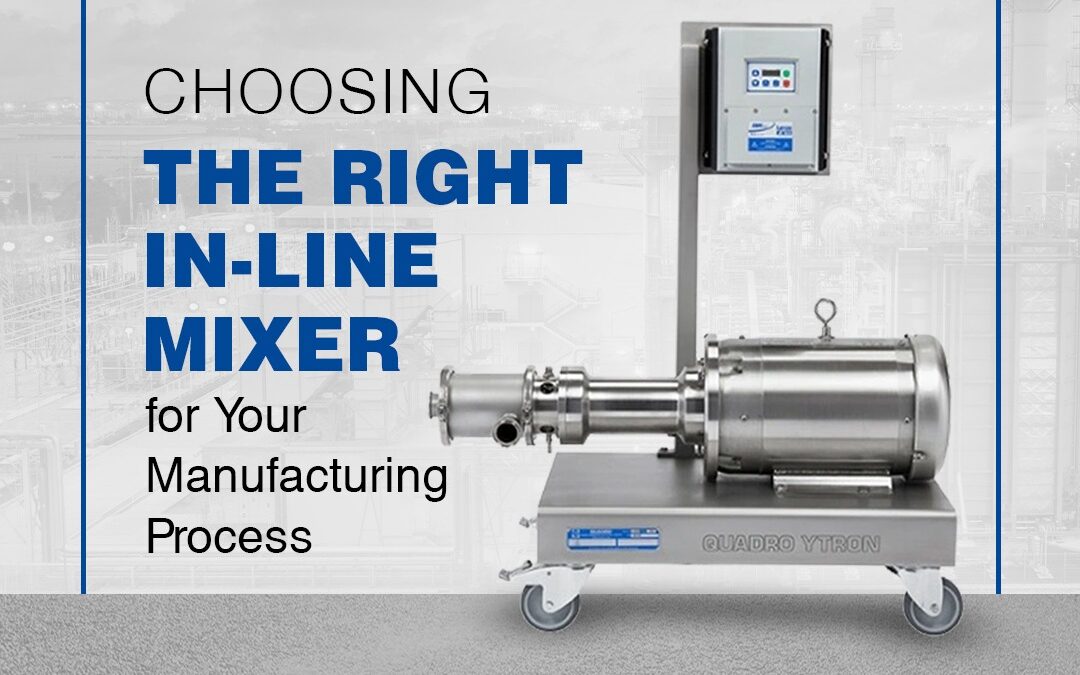Before we start delving into the criteria for choosing a good in-line mixer for manufacturing, let’s first understand what the equipment is. An in-line mixer is equipment used by industries such as pharmaceuticals, food & beverages, beauty & personal care and chemical processing to blend, emulsify or homogenise various kinds of materials. The idea is to enhance the product consistency while increasing the efficiency of the product processing. With an in-line mixer, operators do not require separate mixing tanks. The equipment works continuously, which makes it perfect for operations with high throughput requirements.
There are various kinds of in-line mixers available on the market; however, some of them are the most popular. The first is the high-shear in-line mixers, which deploy rotor-stator mechanisms to break down particles efficiently. Then, there is the static in-line mixer, which uses fixed elements inside a pipe to create a turbulence-like effect that breaks down the particles effectively. Homogenisers, on the other hand, work great when the end goal is to achieve very fine particle sizes and emulsions.
It’s important to note that the right in-line mixer can make a major difference – the product quality will be better, the production speed will be higher, and operating costs will be lower. So how does one choose the right in-line mixer? One can start by asking a few questions:
What exactly are your raw materials?
Do you need to mix solids and liquids? Liquids and liquids? Liquids and gases? The answers to these questions will help you shortlist in-line mixers that specifically meet your requirements.
What is the viscosity of the materials?
Whether the fluid mix you require is highly viscous or not also defines the mixer that will be compatible with your application. So, it’s important to note down the viscosity range of your mix and check if the shortlisted equipment supports it.
What kind of final output is required?
It is also essential to ask if the in-line mixer can deliver your desired output, be it homogenous mixtures fine emulsions or finely sized granules.
Is your raw material shear sensitive?
If you are working with raw materials that can lose their properties by too much shear, you should check if the mixer doesn’t exert any shear forces.
What are your flow rate and pressure requirements?
Different in-line mixers offer different flow rates and can work under different pressure conditions. If you have a high-flow application, you may want to consider bigger or specially designed-mixers that are up to the task. If your application has to accommodate varying flow rates, you should factor that in as well.
Also Read:
Choosing the Right High Shear Mixer for Your Manufacturing Needs
Are your raw materials temperature-sensitive?
If yes, you may want to consider in-line mixers with an in-built cooling system that immediately cools the final mixture after particle reduction or homogenisation. Alternatively, you can also go for in-line mixers that offer gentle mixing actions and do not create much heat.
Do you have a small facility or a large-scale production unit?
Different in-line mixers are built to handle different production volumes. A compact mixer would make more sense for a small-scale facility and larger one for big production unit.
What kind of operational cost are you looking at?
When it comes to operational costs, it’s important to look at the lifecycle cost and not just the acquisition cost. The point is that you must check the energy efficiency of the in-line mixer before buying. At the same time, try to understand the maintenance requirements. Does the mixer feature too many parts? What material is every part made of? Is the installation going to be hassle-free? The answer to these questions will help you understand the total operational cost of the in-line mixer.
Is the in-line mixer supplier reputed?
Once you have researched the specifications of the in-line mixer and understood its working mechanism and compatibility with your application, the next step is to check if the brand offering the equipment is well-known.
High shear mixers by Quadro
Quadro is a reputed brand that designs and manufactures advanced mixing equipment for various industries, including pharmaceuticals and cosmetics. The brand offers a single-pass processing technology which offers several benefits including:
- Reduced batch processing time
- Efficient use of raw materials
- Less wastage
- Consistent mixing
The brand offers several options to its customers. For example, Quadro’s in-line powder disperser – Quadro Ytron® ZC, by utilizing powder dispersion techniques, can work with the most difficult-to-wet powders, thickening agents, additives and rheology modifiers. As a result, these mixers are quite popular in the manufacturing of personal care, cosmetics and chemicals. Quadro Ytron® Z Emulsifier and High Shear Mixer, on the other hand, offer best-in-class consistency when it comes to processes such as macro-emulsion processing and homogenisation.
To learn more about Quadro’s single-pass in-line mixers, please check out their website:
https://www.quadroliquids.com/
